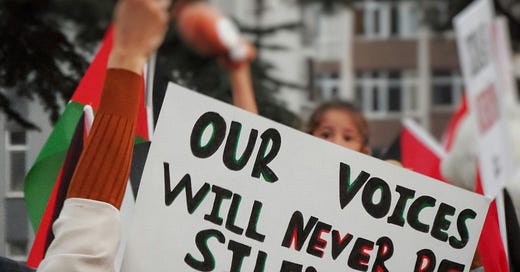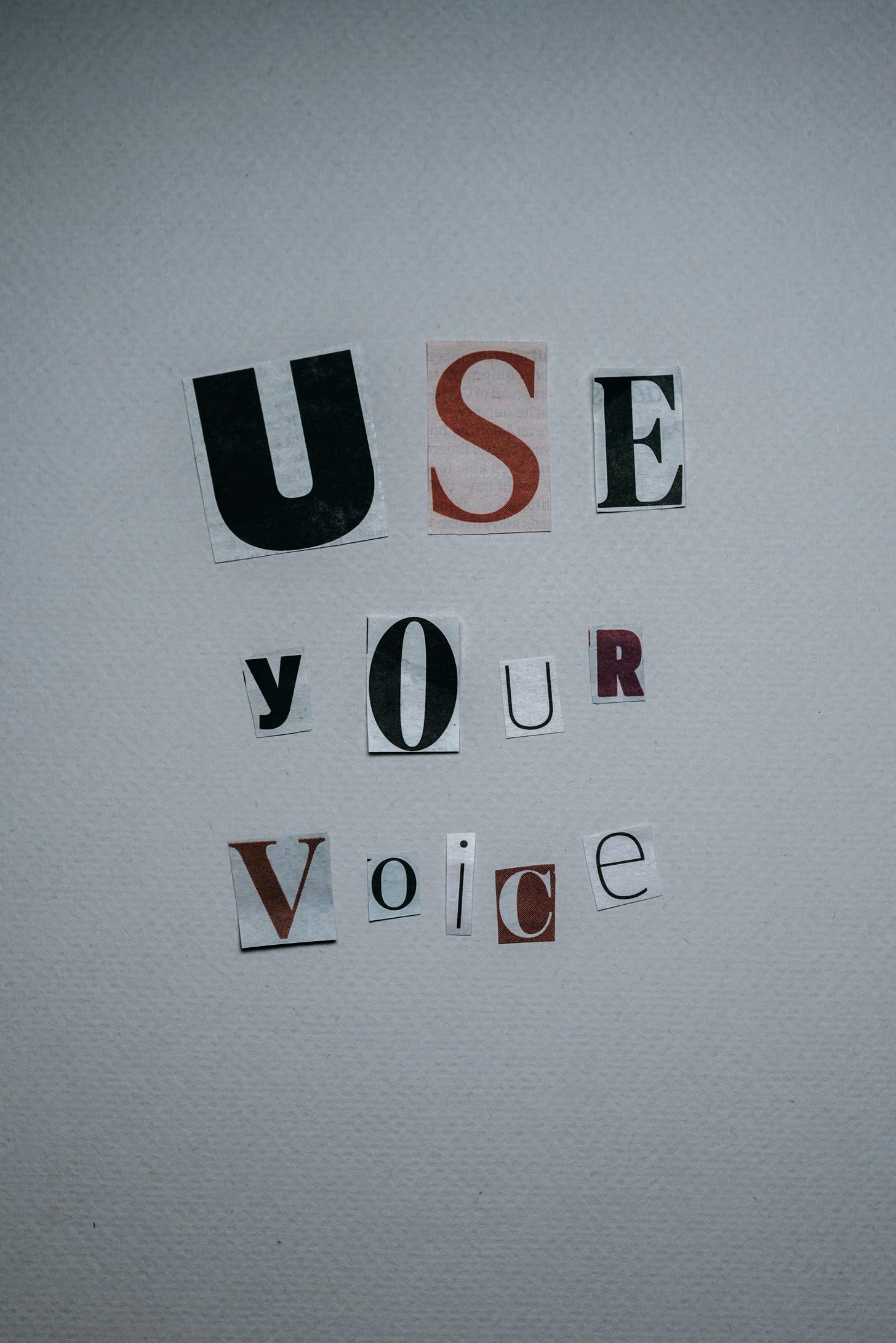
In last week’s article, How Do I Say Goodbye?, I opened a window into my personal journey with grief, sharing how it shaped me, but what I did not share is how it also initially silenced me. I’ve been reflecting deeply since then, and it has made me confront another silence—one that is more troubling, more urgent. This silence is my response to the ongoing genocide in Palestine and the suffering of Muslims across the world. As I write these words, I am filled with a sadness so profound that it almost paralyzes me, binding my tongue, constricting my voice. This silence, I now realize, is not just mine. It belongs to many of us, and it speaks volumes.
The Silence of Deep Wounds
There is a phenomenon that occurs when the heart is overwhelmed by sorrow: a retreat into silence. According to psychological research, people often withdraw when they are deeply wounded. This silence serves as a protective barrier, a way to process internal turmoil that feels too vast for words. It is said that “the deeper the sorrow, the less tongue it has.” When we are confronted with the relentless images of destruction, the cries of children, the helplessness of mothers, the desecration of holy places—it’s as though our voices are stolen from us.
But is this silence a form of surrender, or can it be something else? Allah Subhanahu wa Ta’ala says in the Quran: “Do not grieve, indeed Allah is with us.” (9:40) And yet, even knowing this, the grief feels unbearable at times. Perhaps that’s why my voice has turned inward, seeking refuge in dua, whispering to my Lord in the silence of the night when the world is asleep. In these moments, I understand that my silence is not a weakness, but a space where my faith is nurtured, where I seek solace in the One who never turns away.
Grief and Guilt: A Heavy Burden

What weighs on my heart more than anything is the guilt. As I sit here, sipping on my morning coffee, I can’t help but think of the mothers in Gaza who can’t find clean water for their children. As I worry about mundane things like which dishwasher to buy, there are families in Sudan who have lost everything to war and famine. Or a Uyghur woman, my Muslim sisters who have had their children ripped from them at birth and sent to so called education camps which are tantamount to concentration camps, in China. Learn more here. How can I reconcile these two realities—the comfort of my life here in the West with the unimaginable suffering of my brothers and sisters abroad?
This guilt is a burden many of us carry. The Prophet Muhammad ﷺ said, “None of you truly believes until he loves for his brother what he loves for himself.” (Sahih Muslim) And yet, here we are, living in relative ease while the Ummah bleeds. Is it any wonder that I, like many of you, feel paralyzed? The sheer scale of the injustice, the oppression, the genocide—it’s enough to make anyone feel powerless. But does this guilt serve us, or does it, too, silence us?
A Wake-Up Call for the Ummah
What grieves me most is that it took a genocide—a very public, brutal genocide—for the Ummah to wake up. For 75 years, the people of Palestine have lived under occupation, their homes demolished, their lands stolen. And what of the Rohingya? The Uyghur Muslims in China? The suffering in Afghanistan, Somalia, Sudan, Yemen and did we forget about the Rohingya? These are not new wounds. They are old, festering wounds that we, as an Ummah, have allowed to bleed for far too long.
Allah swt warns us about the consequences of turning away from injustice:
8:25
وَٱتَّقُوا۟ فِتْنَةًۭ لَّا تُصِيبَنَّ ٱلَّذِينَ ظَلَمُوا۟ مِنكُمْ خَآصَّةًۭ ۖ وَٱعْلَمُوٓا۟ أَنَّ ٱللَّهَ شَدِيدُ ٱلْعِقَابِ ٢٥
Beware of a trial that will not only affect the wrongdoers among you. And know that Allah is severe in punishment.
We cannot afford to be complacent. We cannot afford to remain silent.
But the question remains—what can we do? What is enough?
The Power of Dua and Beyond
For me, the answer begins with dua. Every action, every word, every step we take must begin with invoking the name of Allah. It is He who is the source of all strength, all justice, all victory. But dua alone is not enough. We must move beyond our comfort zones. We must be willing to take action, however small it may seem.
I have come to understand that my protest, my contribution, will be through my writing. Words have power. They can inspire, they can mobilize, they can heal. But words alone are not enough. We must also boycott, we must donate, we must educate, and above all, we must stand united. Silence may be a form of processing grief, but it cannot be our only response. We must let our grief propel us into action.
The Weight of Everyday Moments
Sometimes, the guilt is most palpable in the simplest moments. I’ll sit in my home, enveloped by the peace of a quiet morning, listening to the birds sing as the sun rises. It’s a time I cherish—a time when I can just be. But even in this serenity, a shadow of guilt falls over me. I think of those who don’t have this safety, who wake up to the sound of bombs instead of birds. I think of mothers in Gaza, in China, in Sudan, just too many places, who cradle their children in fear, wondering if today will be their last day together.
And then there are times when I find myself complaining about the smallest inconveniences—like when my coffee order is wrong. I feel the sting of ingratitude, and guilt washes over me. How can I be so concerned with something so trivial when there are people who have nothing? When there are children who don’t even know what a safe home feels like? And it is the children’s suffering that hurts the most. How I want to just scoop them up and run them to safety, but I can’t. These moments, these realizations, pierce my heart with a sharpness that is hard to bear.
Finding Our Voice
So, I ask you, dear reader—what will it take for you to wake up and stay awake? What action will you take to stand against injustice, to stand with your brothers and sisters who are suffering? Will you let guilt silence you, or will you let it spur you into action? The choice is yours.
For me, it is no longer enough to remain silent. I will write, I will make dua, I will support in every way I can. And I urge you to do the same. Because in the end, Allah does not love injustice, and He does not love those who remain indifferent to it.
As we reflect on these heavy truths, let us remember that our voices, our actions, no matter how small, are powerful. Let us use them to bring about the change we so desperately need. May Allah guide us, may He strengthen us, and may He bring peace and justice to all those who are suffering. Ameen.
Call to Action
After reading this, I encourage you to take a moment to make dua for those suffering, and then consider donating to a trusted charity or joining a boycott that supports their cause. I love the transparency of MATW and you can donate here. Even small actions, when done collectively, can create waves of change. Our strength lies in our unity. Imagine the impact we could have if each of us took just one small step towards justice. What will you do today, no matter how small, to stand with your brothers and sisters in need?
Remember, every act of justice, no matter how minor, is beloved to Allah and brings us closer to His mercy.
I love you all for the sake of Allah. Sunday Serenity will dedicate every 1st newsletter of the month to the oppressed. It will be my way of using my voice for the ummah!
Forgive Me

To my dear Muslim brothers and sisters in Gaza, in Yemen, in Sudan, in Somalia, in Afghanistan, to the Rohingya, to the Uyghur in China, and to every soul enduring oppression across this world—those who suffer in silence, within the walls of their homes, where only Allah hears your cries—I humbly ask for your forgiveness. Forgive me for the times I remained silent when I should have spoken out, for the times I allowed my voice to waver when it should have been a cry for justice.
Know that my love for you, for the sake of Allah, is deep and sincere, and I promise to do better by you, to stand with you in this fight against injustice.
May Allah ﷻ, in His infinite mercy, ease your suffering and grant you strength. May He send His mighty army of angels to shield you from harm. May He accept those who have been murdered, who have been brutally taken from us, as martyrs, honored in His presence. And may He grant those who remain the sabr, the comfort, the blessings, and the safety you so desperately need.
May Allah ﷻ bring an end to your suffering, an end to your oppression, and may He bestow upon you peace and justice, and unite the Ummah. Ameen.
I invite you to take a moment to listen to Surah Rahman, the chapter of the Qur'an that beautifully recounts the countless blessings of Allah. As you listen, reflect deeply on the verse where Allah asks:
فَبِأَىِّ ءَالَآءِ رَبِّكُمَا تُكَذِّبَانِ
"Then which of your Lord’s favours will you both deny?” Surah Ar-Rahman
Allah repeats this questions 31 times in this surah of 78 ayat (verses). It is a question we must search our hearts to answer.
Journal Prompt

As you contemplate what Allah is saying to you directly, ask yourself:
In the midst of my own comforts and blessings, how have I overlooked or even denied the countless favors of my Lord?
What blessings have I taken for granted, especially in light of the suffering faced by my brothers and sisters around the world?
How can I honor these blessings by standing up for justice and using my voice for those who cannot speak?
Take some time to reflect on these questions in your journal. Consider sharing your thoughts in the comments so we can support each other in this journey of awareness and action.
Write your reflections in your journal and consider sharing your thoughts in the comments. Let us engage in this collective reflection, not just as individuals, but as a community, striving together to recognize our blessings and respond to the suffering of our Ummah with greater empathy, action, and sincerity.







